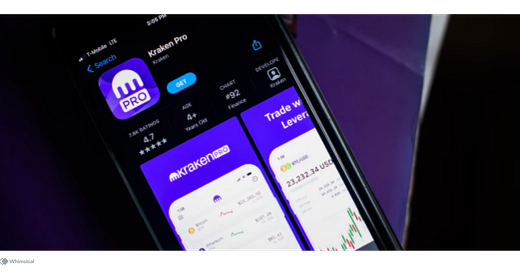Good morning. It’s Thursday, May 22. Today we are covering:
Apple, Tesla and Nvidia Shares to Trade as Digital Tokens on Crypto Exchange Kraken
'Microsoft has simply given us no other option,' Signal says as it blocks Windows Recall
Mysterious Database of 184 Million Records Exposes Vast Array of Login Credentials
Has Starlink already won the new space race?
China's Xiaomi claims new phone chip rivals Apple at a cheaper price
Let’s dive in
Apple, Tesla and Nvidia Shares to Trade as Digital Tokens on Crypto Exchange Kraken
By Alexander Osipovich via Wall Street Journal
Kraken will begin offering tokenized shares of Apple, Tesla, Nvidia, and other popular stocks to non-U.S. customers, enabling global access to U.S. equities via a blockchain-based system.
These digital tokens will be tradable 24/7, allowing users to invest even when traditional U.S. markets are closed.
The move positions Kraken at the forefront of crypto-financial innovation, aiming to simplify cross-border equity investment through decentralized ledger technology.
𝕏: Exclusive: Kraken plans to launch tokenized stocks and ETFs for non-US customers in the coming weeks. The rollout will target Europe, LatAm, Africa and Asia. Kraken says it's "actively working with various regulators" to get the needed greenlights -
'Microsoft has simply given us no other option,' Signal says as it blocks Windows Recall
By Dan Goodin via Ars Technica
Signal has blocked Windows from taking screenshots of its desktop app by default, citing privacy risks posed by Microsoft’s AI tool Recall, which captures user activity every three seconds.
Despite Microsoft's redesign of Recall—now opt-in with encrypted storage—Signal warns it still indexes sensitive content like messages and medical data without full user control or consent.
Lacking a direct opt-out API, Signal repurposed a DRM feature meant for copyright protection to shield chats from Recall, criticizing Microsoft’s failure to offer proper privacy tools for developers.
𝕏: The rushed integration of AI into everything is a major threat to privacy, as we've been saying. Microsoft Recall is a great (not great!) example of exactly why--it screenshots everything on your desktop, to give AI the data to tell you...what you were doing on desktop… - Meredith Whittaker (@mer__edith)
The best way to reach new readers is through word of mouth. If you click THIS LINK in your inbox, it’ll create an easy-to-send pre-written email you can just fire off to some friends.
Mysterious Database of 184 Million Records Exposes Vast Array of Login Credentials
By Matt Burgess via WIRED
Security researcher Jeremiah Fowler uncovered an exposed Elastic database containing 184 million records of login credentials—spanning services like Apple, Google, Facebook, and government domains—with no clear owner or origin.
The database included usernames and plaintext passwords labeled in Portuguese, linked to platforms such as Instagram, Roblox, Discord, PayPal, and more, plus .gov emails from 29 countries, posing potential national security risks.
The breach appears to stem from infostealer malware or criminal compilation efforts, offering what Fowler called a “cybercriminal’s dream working list,” before access was shut down following his alert to World Host Group.
Has Starlink already won the new space race?
By Cleve Jones via Financial Times
Starlink, with over 7,300 operational satellites and more than 5 million customers, dominates the low Earth orbit (LEO) internet market, leveraging SpaceX's in-house rocket launches and satellite production to maintain a massive technological and deployment lead.
Rivals like Amazon’s Project Kuiper, China’s Guowang and SpaceSail, and Eutelsat’s OneWeb are racing to catch up, facing challenges like high capital costs, regulatory delays, and launch bottlenecks, while aiming to serve niche enterprise and sovereign markets.
The global LEO race is not just commercial but deeply geopolitical, with concerns over Elon Musk’s political ties and Starlink’s military utility prompting EU, China, and other nations to accelerate sovereign satellite systems as part of broader digital infrastructure and security strategies.
China's Xiaomi claims new phone chip rivals Apple at a cheaper price
By Evelyn Cheng via CNBC
Xiaomi unveiled its new Xring O1 chip, claiming it outperforms Apple’s A18 Pro in metrics like heat efficiency during gaming, and integrated it into the 15S Pro, priced at 5,499 yuan ($764)—well below the iPhone 16 Pro’s 7,999 yuan price tag.
CEO Lei Jun announced a 200 billion yuan R&D investment over five years and noted mass production of the 3nm chip, part of a broader effort to reduce reliance on Qualcomm and MediaTek chips.
Xiaomi also previewed the YU7 electric SUV, launching in July with Qualcomm and Nvidia chips, an 835 km range, and advanced driver assist—building on its momentum from the SU7 sedan and signaling broader ambitions in smart mobility.
We're thrilled to bring you ad-free news. To keep it that way, we need your support. Your pledge helps us stay independent and deliver high-quality insights while exploring new ideas. What would you love to see next? Share your thoughts and help shape the future of Newslit Daily. Thank you for being part of this journey!
Trending in AI
OpenAI Unites With Jony Ive in $6.5 Billion Deal to Create A.I. Devices
Google has a big AI advantage: it already knows everything about you
OpenAI to Buy AI Device Startup From Apple Veteran Jony Ive in $6.5 Billion Deal
Amazon’s AI-generated ‘shopping experts’ summarize product details in new audio feature
Shopify launches an AI-powered store builder as part of its latest update
Thanks for reading to the bottom and soaking in our Newslit Daily fueled with highlights for your morning.
I hope you found it interesting and, needless to say, if you have any questions or feedback let me know by hitting reply.
Take care and see you tomorrow!
How was today’s email?



















Share this post